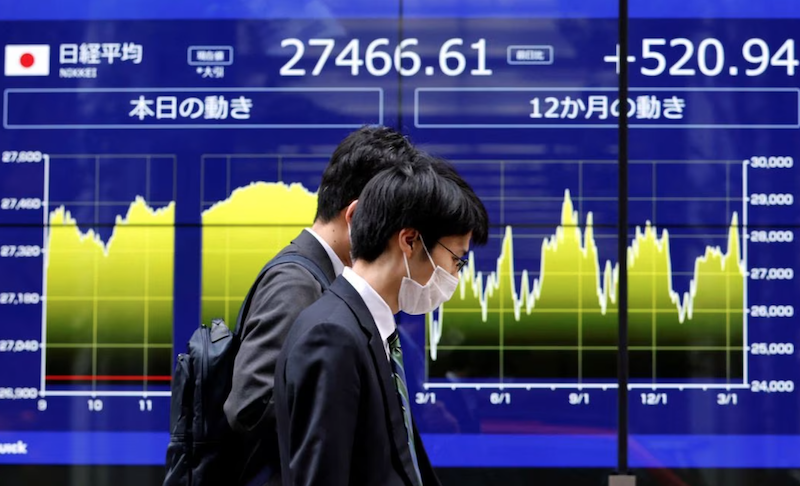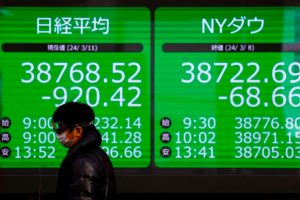Shares in Japan and other Asian markets rebounded strongly on Tuesday after an historic meltdown on Monday that sent shockwaves through global financial markets.
The Nikkei stock index jumped by 10.23%, or 3,217 points, which was its biggest one-day percentage rise since October 2008.
The broader Topix climbed 9.3% to 2,434.21, while shares also rose notably in Taiwan and Korea.
ALSO SEE: US Likely to Ban Use of Chinese Software in Autonomous Cars
The 12.4% fall in Tokyo on Monday – the market’s biggest single-day rout since the 1987 Black Monday crash – followed the Bank of Japan’s decision to raise interest rates for just the second time in 17 years. It sent the yen soaring against the dollar, which made Japanese stocks and exports more expensive for foreign investors and buyers.
Investors had been shaken by last week’s plunge in global stock markets, US recession risks and worries investments funded by a cheap yen were being unwound, triggering Monday’s sell-off.
Traders said on Tuesday that investors now appeared to be reconsidering the severity of their initial response, buying back shares on the dip.
“Fundamentally, nothing significant has changed for the Japanese economy. It is the unwinding of the carry trade driving a lot of the momentum sells,” Ray Sharma-Ong, head of multi-asset investment solutions for Southeast Asia at abrdn, said.
The Nikkei rally helped lift other Asian stock markets. Overnight, safe-haven US yields too had risen from lows in a sign the panic was abating.
But uncertainties remained, with analysts pointing to the possibility of more volatile market moves in the near-term.
“We’re not yet sure if this is just a breather between water-boardings or there is more pain to follow,” Matt Simpson, a senior market analyst at City Index, said.
Officials hold emergency meeting
Japanese officials meanwhile scrambled to calm markets, with Prime Minister Fumio Kishida urging caution and calling on market participants to stay calm.
An emergency trilateral meeting of the Ministry of Finance, Financial Services Agency and the Bank of Japan was held at 0600 GMT to discuss markets.
Khoon Goh, head of Asia research at ANZ, noted that the Nikkei also rebounded to varying degrees after the three previous occasions when it experienced double digit declines, including in the wake of the global financial crisis in 2008 and Tohoku earthquake in 2011.
“But it took a while before the Nikkei clawed back all those losses,” he said.
From July 11 to Monday’s close of 31,458.42, the Nikkei has seen 113 trillion yen ($792 billion) wiped off its peak market value.
Monday’s collapse was a “reminder that it is next-to-impossible to diversify equity risk by region (or by sector or style) during major corrections or bear markets,” Stephen Dover, chief market strategist and head of Franklin Templeton Institute at Franklin Templeton, said.
“Opportunity will arise, but in our view, it is premature to step in at this point.”
Last week, the BOJ raised interest rates to levels unseen in 15 years, a hawkish move that analysts also say spooked the market especially given fears of a possible US recession.
“The market was afraid (the BOJ) may tighten too fast,” Kenji Abe, chief strategist at Daiwa Securities, said.
BlackRock Investment Institute said on Tuesday that they see a “greater risk of a BOJ policy misstep” and are reviewing their Japan overweight position.
On Tuesday, big name shares like chip-related stocks Tokyo Electron, up over 16%, and Advantest, rising 15.5%, surged to give the Nikkei a sizeable boost. AI-focused startup investor SoftBank Group jumped 12.1%, and Uniqlo parent firm Fast Retailing gained 7.8%.
Circuit breakers were triggered multiple times before and during the sessions, causing the temporary suspension of trading in Topix and Nikkei futures.
Taiwan market rises, but China stocks fall
Taiwan stocks also closed higher on Tuesday from Monday’s record plunge, with contract chipmaker TSMC up 8%, but sentiment remains cautious amid lingering investor concerns about the outlook for tech companies and the US economy.
Taiwan’s main index ended up 3.4% after climbing to as high as 20,640.44 points on Tuesday. It plunged by a record 8.4% on Monday mainly on global fears the US could be heading for recession.
Meanwhile, China stocks fell to six-month lows despite the regional relief rally, while the yuan eased from Monday’s 7-month high against the dollar, challenging views Chinese assets would be a safe haven from a global market rout.
But China’s long-term yields jumped on fears of government-orchestrated bond selling to cool a sizzling rally, rather than a rosier economic outlook.
The bluechip CSI 300 Index ended the session flat, dropping to its lowest since February after opening the day higher. The Shanghai Composite Index closed up 0.2%. Hong Kong’s Hang Seng closed down 0.3% after falling to the lowest since April 22 in the previous session.
The onshore yuan changed hands around 7.1450 per dollar in late afternoon, sharply lower than the seven-month peak of 7.1120 hit on Monday.
Christopher Ying, investment manager at Shanghai Ju Cheng Asset Management, said he doubted China would be a safe harbour from the global decline because of its shaky fundamentals.
Investors feeling the pulse of China’s economy “need to wait until the end of China’s mid-year earnings season, and also the Fed rate cut expected in September,” Ying said.
Some investors also attributed the stock market weakness on Tuesday to the rise in long-term yields, which could curb stock valuations.
China’s 10-year treasury yield rose as much as 1.5 basis points to 2.165%, having jumped 4 bps since Friday. Futures contracts on the bond fell as much as 0.5%, and posted their biggest percentage fall in a month.
The correction in bond prices, which move inversely to yields, came after state banks were seen selling large volumes of benchmark 10-year treasuries on late Monday afternoon.
Appetite for bonds was also soured after China’s central bank, the People’s Bank of China (PBOC), asked some financial institutions to report daily changes in their long-term treasury bond positions and balances, suggesting closer scrutiny.
Against the rest of Asia, China and Hong Kong underperformed on Tuesday.
Other Asian markets recovered amid soothing comments from overseas central bankers. But Chinese equities have been underperforming versus regional markets this year that has made the market relatively immune to global volatility, said Xia Haojie, an analyst at Guosen Futures in Shenzhen.
“Chinese stocks are already lying on the floor,” he said.
The lagging growth of the world’s second-largest economy is at the forefront of investors’ minds amid deflationary pressures, a protracted property slump, and anaemic consumption.
Elsewhere across the region, in earlier trade, Sydney, Seoul and Bangkok rose but Singapore, Mumbai and Wellington suffered more selling, while Manila was flat.
Key figures
Tokyo – Nikkei 225 > UP 10.23% at 34,675.46 (close)
Hong Kong – Hang Seng Index < DOWN 0.31% at 16,647.34 (close)
Shanghai – Composite > UP 0.23% at 2,867.28 (close)
London – FTSE 100 > UP 0.24% at 8,027.73 (0936 BST)
New York – Dow < DOWN 2.60% at 38,703.27 (Monday close)
- Jim Pollard with Reuters
ALSO SEE:
Stock Markets Plunge Across Asia, With the Nikkei Sinking 13%
China to Set Emission Quotas for Industries, Economic Planners
Bank of Japan in Rare Rate Rise, Bond Taper Plan Unveiled
Global Corporate Outlook Hit by China’s Worsening Slowdown
China Faces Low Growth Without Greater Stimulus, Analysts Say
Hedge Funds Boost Japan Allocations, China Stocks at 5-Year Low
























